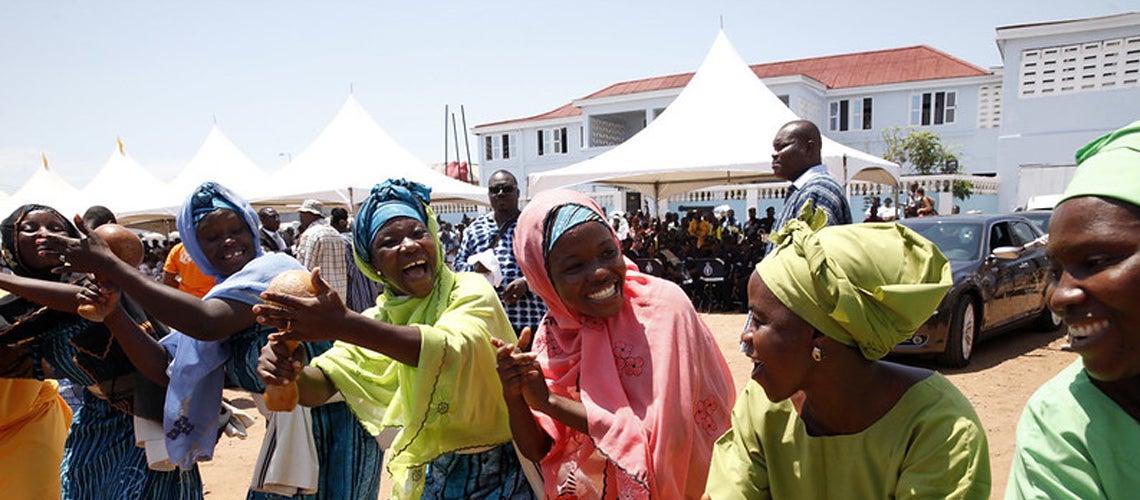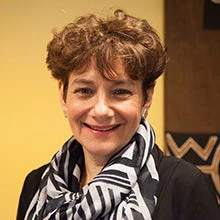 People dancing at the announcement of the global launch of Poverty in Rising Africa in Accra, Ghana on October 16, 2015.
People dancing at the announcement of the global launch of Poverty in Rising Africa in Accra, Ghana on October 16, 2015.
As the world comes closer to breaching the planetary boundaries that keep us and the natural world alive, conflicts become more severe and pervasive, and persistent inequality and social media feed increasingly polarized societies, the need for collective action has become more pressing than ever. While it’s critical to identify financial and technological solutions to today’s crises, getting the social aspects right underpins their success.
Climate action demands changes to economies, production systems, and lifestyles built on cultural values and norms. Addressing conflict and inequality requires overcoming deep-rooted tensions over access to resources and power dynamics related to rights, decision-making authority, cultural practices, and voice. Building political will and consensus to implement such change requires social sustainability—communities and societies built on principles of inclusion, resilience, cohesion or trust, process legitimacy, and accountability, which allows all people to thrive today and also tomorrow. Simply put, we need to build livable communities to create a livable planet.
So, what makes a community livable and why does that matter for our development challenges? Communities with more trust are more likely to work together to tackle common challenges. For example, communities that scored higher on trust were more likely to adopt COVID-19 restrictions. Increased trust levels are also associated with lower inequality, a greater willingness to support measures to address climate change, and higher demand for education. Yet, according to a World Values study, trust is currently at the lowest level since 1984, with 20 percent of those surveyed saying most people can be trusted in 2022 compared to 40 percent in 1984.
Similarly, when development policies recognize local values and power structures—while also being inclusive and reflecting broader public interest—they are considered legitimate and have a greater likelihood of implementation . Yet, increasing polarization, special interest groups, and elite capture have undermined the legitimacy of policy making. This is especially true for policies related to vulnerable groups in conflict areas and around some of the most contentious and impactful climate ones, such as coal mine closures, carbon payments and benefit sharing, and loss and damage expenditures.
Building trust and social cohesion, as well as decision-making processes that deliver just and legitimate outcomes, is possible. To this end, the World Bank Group’s Evolution Roadmap, the new Corporate Scorecard, and the Fragility Strategy all emphasize the importance of building inclusion, resilience, and trust-building and of engaging with civil society.
Though increasingly recognized as important, how can social sustainability be advanced operationally? Too often, programs to make projects more inclusive, or efforts to strengthen the social contract or build resilience, are seen as illusive and vague and therefore overlooked. More data and evidence are needed to show how trust and legitimate decision-making can be built and how they impact development outcomes, but there is still much we are doing right now that can be scaled up:
- Community-level efforts are fostering inclusion, resilience, and process legitimacy through participatory planning and budgeting, benefit-sharing instruments, and using digital tools to exchange information.
In Kenya, for example, the Financing Locally Led Climate Action (FLLoCA) Program is providing $250 million to rural counties to support climate resilient investments in water and sanitation, agriculture, and basic infrastructure. Based on participatory community planning, it has reached an estimated 32.7 million beneficiaries. The project is also developing an index for measuring resilience at the county level to track project outcomes.
The COSO project in Togo is focused on the country’s northern region, where conflict and exclusion are high. It is improving access to basic services and infrastructure for 468,000 people, providing support for sports and cultural activities identified by youth groups, and strengthening village committees and planning. Digital tools are tracking expenditures and results at the community level, building transparency and accountability. An ongoing impact evaluation aims to track the effect of the project on social cohesion and trust in government.
In Rwanda, the Socio-Economic Inclusion of Refugees and Host Communities in Rwanda Project is supporting refugees and host communities by improving access to basic services and livelihoods, as well as strengthening environmental management. Four years into the project’s implementations, there was an 11-percent increase in social cohesion, according to a compositive index measuring social cohesion between refugees and host community members and attitudes toward the government.
- Systematically engaging citizens in development can enhance inclusion, the legitimacy of government decision-making, and social cohesion.
In Iraq, the Emergency Operation for Development Project used a mix of public outreach, community feedback meetings, community focal points, social media platforms, a citizen’s hotline and youth monitoring to address urgent humanitarian needs and promote social cohesion.
The Ethiopia Social Accountability Program collaborated with civil society organizations to bring together citizens, service providers, and public officials to form accountability committees. The result was greater local participation in policy dialogue and decision-making and increased satisfaction with public services.
Through implementation of the Social Accountability Framework (ISAF) program in Cambodia, citizens are holding service providers directly accountable for the quality of their work, drawing on agreed standards for service delivery and using participatory evaluations that produce collectively agreed-upon action plans. The initiative has led to improvements in service delivery and better governance.
- The World Bank’s Environmental and Social Framework (ESF) provides a strong model for how to approach green, resilient, and inclusive development.
ESF gives us the opportunity to think beyond risk management and focus on inclusive societies. It sets rules for projects to build trust that investments will not harm people and communities, that local voices are heard, and that project benefits reach those who are at risk of being excluded. This is not only critical for inclusion but also for developing trust in government and legitimacy around decision-making and investments.
For instance, the Pre-Service Training for Health Workers project in Cambodia increased the share of disadvantaged groups, such as Indigenous Peoples, people with disabilities or LGBTQ populations, in the health care work force. The project also encouraged high school students and youth from various ethnic minorities to enroll in health worker training programs with a culturally appropriate curriculum. These initiatives helped raise the trust of communities in the health care system and put them in the driver’s seat as active participants.
Each season is getting warmer, conflicts are growing more severe, and the gap is widening between the haves and have-nots. For real and lasting change, we must do more to build the social sustainability that will enable citizens, refugees, and governments to work together to put financing and technical solutions to good and effective use. Building cohesive, inclusive, and resilient communities serves as a cornerstone of our efforts to create a livable planet.


Join the Conversation